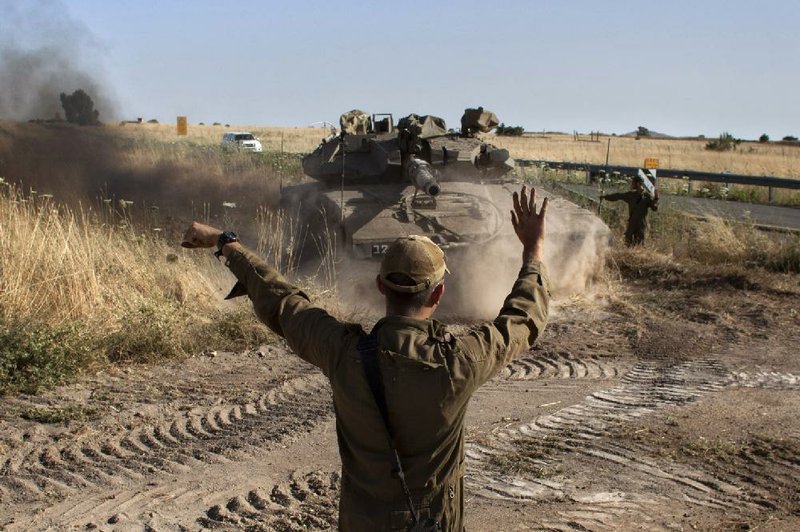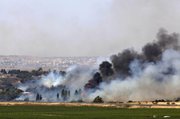QUNEITRA, Golan Heights - Syrian rebels briefly seized control of a border crossing along the Israeli-controlled Golan Heights on Thursday, prompting the withdrawal of a major Austrian peacekeeping contingent and heightening fears in Israel that it could soon be dragged into the neighboring country’s civil war.
From the Israeli side of the Golan, Syrian tanks and armored vehicles could be seen across the border. Large explosions could be heard throughout the day, and thick smoke and flames rose from the area. Israeli TV stations showed images of Israeli tourists flocking to the Golan to look across the frontier and gawk at the fighting.
By nightfall, the situation appeared to be quieting down. Israel’s deputy defense minister, Danny Danon, said Israeli troops along the border remained on high alert, but no special actions had been taken.
“We are following very carefully what’s happening in Syria,” Danon said. “We will do whatever is necessary to protect the interests of Israel.”
Israel fears that Islamic militants who have joined the rebel ranks in trying to oust President Bashar Assad will turn their guns toward Israel if they topple the Syrian leader. Islamic groups are believed to be active in the fighting in the Golan area. Israel also has expressed concerns that Assad’s sophisticated weapons could slip into the hands of hostile groups, including Assad’s ally, Hezbollah.
The Jewish state has kept a wary eye on the fighting next door since the conflict began in March 2011, and in recent months has been bolstering its forces in the area and reinforcing a fence along the frontier.
The rebels overran the border position near the abandoned town of Quneitra early Thursday, holding their positions for several hours before Syrian government troops retook it. The international peacekeepers who maintain a 40-year-old truce receive most of their supplies through that position from Israel.
Fierce gun battles forced peacekeepers to seek shelter in a nearby base, and the Philippine military said one of its men serving in the force was wounded in the leg when a mortar or artillery shell struck the area. U.N. diplomats said an Indian peacekeeper also was injured.
In Vienna, Austrian leaders said the fighting made it necessary to withdraw their troops.
Defense Minister Gerhard Klug said he expected the withdrawal to be done in two to four weeks, but it is possible to complete it “within a few hours” if new violence threatened the soldiers’ security.
“For the first time, it was not possible for the Syrian government to guarantee proper support of the U.N.,” he said.
The decision dealt a heavy to blow to the 911-member U.N. force, which includes the 377 Austrian peacekeepers as well as 341 from the Philippines and 193 from India. Croatia withdrew its people in March amid fears they would be targeted.
Twice in recent months a rebel group has taken groups of the Filipino peacekeepers captive, releasing them unharmed after several days. The Philippine government also has been considering pulling its peacekeepers out of the area.
Israel and Syria agreed to creation of the U.N. Disengagement Observer Force after Syria began military action in 1973 in a failed effort to retake the Golan, which Israel captured in the 1967 Mideast war.
Israel and Syria are still technically at war but the quiet that has prevailed for decades along the frontier has allowed Israel to develop the area as a military arena and a tourist destination. The wild and rocky terrain is also home to up to 20,000 Israeli Jews in more than 30 settlements, although Israel’s annexation of the area has not been internationally recognized.
Secretary-General Ban Kimoon said the United Nations is urgently looking for troops to replace the Austrians and warned that any military activity in the zone separating Israeli and Syrian forces could jeopardize the long-held cease-fire.
The Israeli Foreign Ministry said it regretted Austria’s decision and hoped it would not lead to “further escalation in the region.” The Foreign Ministry said it expected the U.N. to uphold its commitment.
Israeli military officials, speaking on condition of anonymity under military protocol, said several Syrians wounded in fighting were taken into Israel for medical treatment. It was not clear whether the wounded were fighters or civilians.
SANA, Syria’s official news agency, said Israeli ambulances had transported some injured rebels, whom it called terrorists, into the Israeli-occupied territories, which it said constituted “new proof of the close link between these terrorist groups and the Israeli occupation.”
Israeli military officials said several errant shells landed in Israeli-controlled territory. Although no injuries were reported, the military restricted access to a main road running along the border for several hours and ordered farmers with fields in the area to remain indoors.
Nadav Katz, 65, of Kibbutz Merom Golan, a communal farm near the crossing, said the area was covered with smoke, and residents could hear gunfire and mortar shells exploding nearby.
“We are concerned that things might evolve into something much harsher that will affect us,” said Katz. “We like the idea that for 40 years the area was peaceful and quiet. Tourists have been coming, fields have been cultivated and children were born,” he said.
Katz said he trusted Israel’s army to defend the area, but residents felt betrayed by the fleeing U.N. troops. More than anything, though, he said people viewed the Syrian fighting as a terrible event. “People are simply sad over the slaughter,”he said.
As well as U.N. personnel, the Quneitra crossing is used by members of the 20,000-strong Druse community of the Israeli-held Golan Heights who are Syrian citizens. The town has been largely abandoned since the 1967 war, though the crossing is sometimes opened to allow Druse residents to export produce or cross into Syria to study or to marry.
Israeli officials say they have no interest in taking sides or getting involved in the fighting. But the military has intervened on several occasions, firing at targets inside Syria in response to shelling that landed in the Israeli side of the Golan.
Fighting between Assad’s forces and mainly Sunni rebels has already spilled over Syria’s borders into Turkey and Lebanon, where factions that support opposing sides have frequently clashed.
Moshe Maoz, a Syria expert at Hebrew University, played down Thursday’s episode. He called it a small victory for the Syrian military and said little would change even if the rebels gained control of the crossing.
“It’s symbolic, but neither al-Qaida nor the mainstream groups are going to shoot at Israel because they know Israel will retaliate very heavily,” he said.
Thursday’s fighting came as a video recording by al-Qaida leader Ayman al-Zawahiri circulated online, calling for Syrians to unite against Assad and create an Islamist state. Al-Zawahiri accused the United States in the recording of plotting to help Islamist fighters topple Assad, before imposing a government loyal to U.S. and Israeli interests.
“America, its agents and allies want you to shed your blood and the blood of your children and women to bring down the criminal Baathist regime,” he said in the video posted on the Mujahideen al-Ansar website.
The clashes on the Israeli border followed a defeat for rebels in the town of Qusair, where they retreated after more than two weeks of fighting against the Syrian army and Hezbollah militants.
According to an activist based in the area who uses the name Abu Rami, thousands of civilians who fled Qusair, many of them injured in the fighting, are now trapped in the nearby village of Bouaida, with no escape route and little medical care. He said large numbers of rebels also fled to the village.
Meanwhile, Russia’s foreign minister said reports about possible chemical weapons use by the Syrian regime should not be used as a pretext for a foreign invasion, saying a more thorough probe is needed.
Sergey Lavrov said Thursday that investigators also must look into claims of chemical weapons use by Syrian rebels.
France and Britain this week pointed at evidence that the nerve gas sarin was used by Assad’s forces, signaling that Syria has crossed a “red line” set by President Barack Obama.
Lavrov warned against “speculations and provocation” surrounding the purported chemical weapons use, saying the claims could be used by “certain forces, who may say that the red line has been crossed and that a foreign intervention is necessary.”
Russia, which has been a key protector of Assad, also announced Thursday that it will keep a fleet of about dozen navy ships in the Mediterranean Sea, a move President Vladimir Putin said is needed to protect his country’s national security. The only naval base Russia has in the Mediterranean and anywhere outside the former Soviet Union is in Syria.
The chief of the military General Staff, Gen. Valery Gerasimov, said Thursday that Russia has 16 navy ships in the Mediterranean. The Defense Ministry said it would regularly rotate them to keep a presence of about a dozen.
Speaking at a meeting with the top military brass, Putin said the sea is a “strategically important region, where we have interests connected with ensuring Russia’s national security.” Information for this article was contributed by Josef Federman, Sebastian Scheiner, Diaa Hadid, George Jahn and Vladimir Isachenkov of The Associated Press; by Isabel Kershner, Jodi Rudoren, Hania Mourtada, Hwaida Saad and Rick Gladstone of The New York Times; and by William Booth and Loveday Morris of The Washington Post.
Front Section, Pages 1 on 06/07/2013


